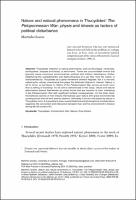Chapter Nature and natural phenomena in Thucydides’ The Peloponnesian War: physis and kinesis as factors of political disturbance
| dc.contributor.author | Soares, Martinho | |
| dc.date.accessioned | 2022-12-22T16:05:42Z | |
| dc.date.available | 2022-12-22T16:05:42Z | |
| dc.date.issued | 2022 | |
| dc.identifier | ONIX_20221222_9788855186124_26 | |
| dc.identifier.issn | 2704-5919 | |
| dc.identifier.uri | https://library.oapen.org/handle/20.500.12657/60364 | |
| dc.description.abstract | Thucydides’ attention to natural phenomena, such as the plague, volcanoes, earthquakes, eclipses and floods, is well known. These are uncontrollable events that typically cause enormous environmental, political and military disturbance, further heightening the unpredictability and destructiveness of a war that, from the outset, is characterised as a great movement (kinesis megiste). But it is not only catastrophic natural phenomena that pique the Athenian historian’s interest. As we aim to demonstrate in this study, nature and natural phenomena impose themselves as active forces that are superior to man, interfering in the Peloponnesian War with significant political consequences. On the other hand, the bellicose actions of man impose themselves upon nature with grave environmental costs. | |
| dc.language | English | |
| dc.relation.ispartofseries | Studi e saggi | |
| dc.subject.classification | thema EDItEUR::D Biography, Literature and Literary studies | en_US |
| dc.subject.other | Thucydides | |
| dc.subject.other | environment | |
| dc.subject.other | war | |
| dc.subject.other | nature | |
| dc.subject.other | ecocriticism | |
| dc.title | Chapter Nature and natural phenomena in Thucydides’ The Peloponnesian War: physis and kinesis as factors of political disturbance | |
| dc.type | chapter | |
| oapen.identifier.doi | 10.36253/978-88-5518-612-4.05 | |
| oapen.relation.isPublishedBy | bf65d21a-78e5-4ba2-983a-dbfa90962870 | |
| oapen.relation.isbn | 9788855186124 | |
| oapen.series.number | 239 | |
| oapen.pages | 29 | |
| oapen.place.publication | Florence |

